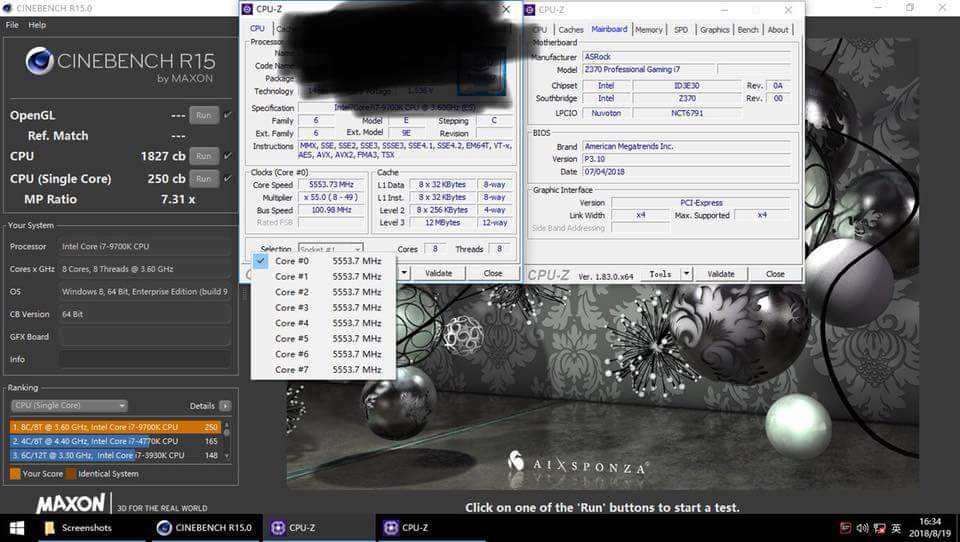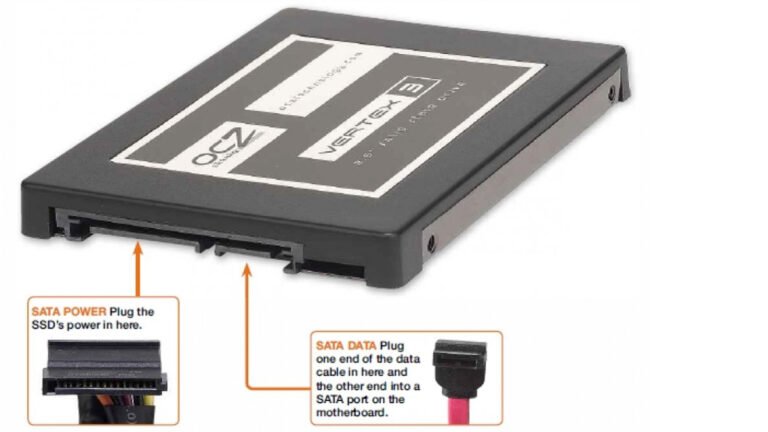How to Oc I7 9700K
The Intel Core i7-9700K is a high-end desktop processor with eight cores. It was released in September 2019 and is based on the Coffee Lake Refresh architecture. The i7-9700K has a base clock speed of 3.60 GHz and can boost up to 4.90 GHz.
It supports DDR4-2666 memory and has a TDP of 95 watts.
- The Intel Core i7-9700K is a high-end desktop processor with eight cores
- It was announced in September 2019 and is based on the Coffee Lake Refresh architecture
- The i7-9700K operates at a base frequency of 3
- 60 GHz and can boost up to 4
- 90 GHz
- It has a TDP of 95 W and supports DDR4-2666 memory
- 1) Install the CPU into the socket
- 2) Connect the CPU cooler to the CPU socket
- 3) Install the motherboard into the case
- 4) Connect all of the cables to the motherboard including power, data, etc
- 5) Install any additional drives or components that are needed
- 6) Turn on the computer and install the operating system
Overclock I7 9700K Msi
Overclocking your I7 9700K MSI is a great way to get more performance out of your PC. There are a few things you need to know before you start, though. Here’s a quick guide to help you get started.
The first thing you need to know is what overclocking is and why you’d want to do it. Overclocking is the process of running your CPU at a higher speed than its advertised clock speed. This can lead to increased performance in games and other applications that benefit from a faster processor.
However, it can also lead to instability if not done properly. That’s why it’s important to know what you’re doing before you start overclocking.
There are two main ways to overclock your I7 9700K MSI: through the BIOS or through software like Intel XTU or Ryzen Master.
We’ll be focusing on the BIOS method here, as it’s generally considered the safer option.
Start by opening up your BIOS and finding the “CPU Overclock” section. From there, you’ll want to increase the “CPU Core Ratio” setting until your CPU is running at the desired speed.
For example, if you want your CPU to run at 4GHz, you’ll need to set the core ratio to 40 (4 x 100MHz). Once you’ve done that, save and exit out of the BIOS.
Now, it’s time to test your overclock!
Download any stress testing tool like Prime95 or AIDA64 and run a stress test for at least an hour or two (preferably overnight). This will help ensure that your overclock is stable and won’t cause any crashes or instability issues down the road. If everything looks good after stress testing, congrats!
You’ve successfully overclocked your I7 9700K MSI!
I7 9700K Overclock Reddit
If you’re looking to overclock your new Intel i7 9700K, there’s a lot of helpful information to be found on Reddit. Here are some of the things you need to know.
First, make sure you have a good cooling solution in place.
The 9700K can get pretty hot when overclocked, so you’ll want to make sure your CPU cooler is up to the task. There are plenty of great aftermarket coolers out there that will do the job nicely.
Next, it’s time to start tinkering with those clockspeeds.
If you’re not familiar with overclocking, it’s basically just adjusting the CPU frequency and voltage settings in order to achieve higher performance levels. It can be a bit daunting if you’ve never done it before, but luckily there’s loads of resources and help available on Reddit (and elsewhere on the internet). Just take your time and experiment a bit until you find what works best for your setup.
Once you’ve got your overclock dialed in, enjoy the extra performance! Just remember to keep an eye on temperatures and don’t push your hardware too hard – otherwise you might run into stability issues or even damage your components.
Best Overclock Settings for I7 9700K
Overclocking your I7 9700K can be a great way to improve its performance. However, it is important to know the best settings to use in order to avoid damaging your processor. In this blog post, we will provide detailed information about the best overclock settings for I7 9700K.
We hope that this will help you get the most out of your processor!
The first thing that you need to do is to identify the safe maximum voltage for your I7 9700K. This can be done by running a stress test on your processor at its stock clock speed.
Once you have identified the maximum voltage, you can begin adjusting the CPU multiplier. It is important to start with small increments and gradually increase the multiplier until you reach the desired overclocking frequency.
Next, you will need to adjust the memory timing.
The goal here is to find the sweet spot between stability and performance. Again, it is important to start with small changes and gradually work your way up. Once you have found a stable memory configuration, you can begin tweaking the CPU frequency again if necessary.
Finally, it is also important to monitor your temperatures when overclocking your I7 9700K. Be sure to keep an eye on both the CPU and GPU temperatures and make sure that they stay within safe limits. If either one begins to approach its thermal limit, be sure to back off on the overclocking until things cool down again.
By following these simple tips, you should be able to safely overclock your I7 9700K without any problems!
I7 9700K Overclock Temperature
The Core i7-9700K is a high-end desktop processor from Intel with eight cores and sixteen threads. It was released in October 2018 and is based on the Coffee Lake architecture. The 97000K has a base clock of 3.60 GHz and can boost up to 4.90 GHz.
It has a TDP of 95 watts and supports DDR4-2666 memory.
Overclocking the Core i7-9700K is pretty easy and straightforward since it doesn’t require any special unlocked multiplier or voltage adjustment like some of the other K CPUs. Just enable XMP 2.0 in your BIOS, select your desired CPU speed, and you’re good to go!
As for temperatures, the 9700K runs quite cool compared to other processors, even when overclocked. When kept under 70 degrees Celsius, you should have no problems with this CPU. However, pushing it beyond that may start to cause thermal throttling which will reduce its performance significantly.
I7-9700K 4.9 Overclock
Overclocking your I7-9700K can be a great way to improve its performance. There are a few things to keep in mind when overclocking, such as making sure you have good cooling and a stable power supply. You’ll also want to increase the voltage and frequency gradually to avoid damaging your CPU.
Once you’ve increased the voltage and frequency, you can start testing for stability. This can be done with a stress test like Prime95 or Linpack. If your system is stable, then congrats!
You’ve successfully overclocked your I7-9700K.

Credit: videocardz.com
What Should I Overclock My 9700K To?
Overclocking your 9700K can be a great way to improve your PC’s performance. There are a few things to keep in mind when overclocking, such as making sure your CPU is properly cooled and that you have a good power supply. You should also make sure that your motherboard supports overclocking.
When it comes to actually overclocking the 9700K, there are a few different ways to go about it. You can use Intel’s Extreme Tuning Utility, or other software like MSI Afterburner. Whichever method you choose, you’ll need to increase the CPU voltage and clock speed.
It’s generally recommended to start with a small overclock (around 10%) and then slowly increase from there.
One important thing to keep in mind is that each processor is different and will respond differently to overclocking. That means that you may not be able to achieve the same overclock as someone else with the same processor – it all depends on how lucky you are with silicon lottery!
Just remember to be patient, take things slow, and enjoy the process of pushing your hardware to its limits.
Is an I7 9700K a High End Cpu?
The Intel Core i7 9700K is a high end CPU released in 2019. It has 8 cores and 16 threads, with a base clock of 3.6 GHz and a boost clock of 4.9 GHz. It also has a 95W TDP and supports DDR4-2666 memory.
How Much Ram is Recommended for an I7 9700K?
An i7 9700K needs a minimum of 16 GB of RAM, but 32 GB is recommended for optimal performance. This processor is powerful enough to take advantage of extra RAM, so if you can afford it, 32 GB is the way to go. If you’re on a budget, 16 GB will still give you excellent performance.
How Hot Should an I7 9700K Run?
Assuming you’re asking how hot the Intel i7 9700K should run under normal conditions, the answer is: not very hot. In fact, most CPUs these days don’t get all that warm unless they’re being taxed quite heavily.
The reason for this is twofold.
First, manufacturing processes have improved to the point where CPUs generate less heat to begin with. Second, better cooling solutions (both air and water) have been developed to dissipate that heat more effectively.
As a result, you shouldn’t expect your i7 9700K to get too hot unless you’re doing some serious number crunching or gaming.
Even then, it shouldn’t get too much above 80 degrees Celsius (176 degrees Fahrenheit). If it does start hitting those kinds of temperatures regularly, something is probably wrong and you should check your cooling solution and make sure everything is running smoothly.
Overclock your i7 9700K for more performance! – Tutorial
Conclusion
The i7 9700K is a great processor for gaming and other demanding tasks. It offers high performance and is very versatile. If you are looking for a powerful processor, the i7 9700K is a great option.








